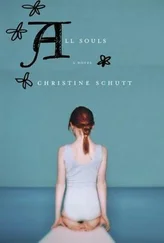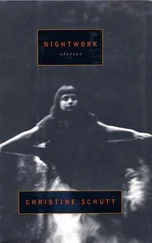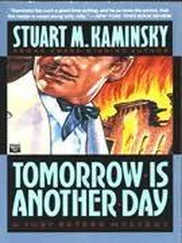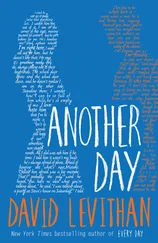“Yes,” she had to say, “but still asleep.”
And Jack? Jack was now so tipped against the sun — the bright shard of his name again — that just to speak of Jack hurt Jean’s eyes; and she did not want to think about the place where she had been or what Jack was doing there or what he would be doing there at night in the facility.
“Not knowing where he sleeps is fine by me,” Jean admitted, but only to Ned. To Ned she complained. Now when she sat on the couch, still red from washing off the facility, she said, “Jack makes me believe he has paid for whatever it is we are doing to him. Does that make sense?” She said, “Please, my back.”
Ned said, “You never made Jack do this.”
Sometimes Ned used a comb on her back. He made tracks and designs with the comb. He wrote his name and asked, “So what did I write then?”
She sat on the couch, tickled by the comb tracking through the lotion, and she said to Ned, “I can’t help myself sometimes. When I am in family I say terrible things….” And she told the boy what things she had said about a man who was yet the father — and she knew that, yet she would speak. She wanted to tell Ned everything. Now, every weekend, it seemed, she came home parched and queasy, calling out to Ned, “Are you here? Anybody home? Yes? No? Who else?”
Once a girl with rainbow hair lay unbuttoned on Ned's bed. The girl was quick to sit up, and she smiled at Jean, but the distraction of the girl’s hair, knotted and skyward from however the girl had been with him, was such that all Jean saw was the girl’s hair and those parts erect from tugging. Just look at the girl’s stubby nipples! So this was Ned’s idea of pretty, Jean thought, and wondered, Was the girl disappointed in her? Was she drab to the girl? For that was how she felt.
“Is this your mother?” from the girl in a girl’s voice, just a whisper.
“Yes.”
This was the mother breaking open gelcaps and licking up sleep or the opposite of sleep, extreme wakefulness, speed. This was the mother using scissors between her legs, staying ready, staying hairless, should someone want to lick her.
Something Jean could never bring up at the family consultation in the facility was what she was doing at home because she was hardly ever sober herself, but she was prudent in her daily use of substances. She measured, she counted, she observed fastidious rituals. She soaped and creamed and powdered when the high was at her throat. At night she drank — then only ales, wines, rarely hard liquor. But she drank to ease the restlessness from the petty drugs she took, gouging tinbacks with a pencil to release sealed tablets, over-the-counter nondrowsy — four, six, eight pills a pop — uninspired habit, nothing serious, but growing, at the worst growing, at the worst becoming what her father’s habit was: Vicodin, Prozac, Valium, Glucotrol, Synthroid, Mevacor, plain old aspirin. Jean’s father had offered, saying, “I don’t know what it’s called, but it’s good.” No, no, no, Jean had resisted. She wanted most of her habit nonprescription and cheap.
No one noticed what she did.
This was especially true at the facility, where Jean had expected to be found out as if passing by a screen and seen clear through; but she slipped past and into the facility with her son and her son’s counselor, and she was fearless again. Everyone was looking at Jack, asking him, “So what do you do around users?”
Jack said, “I don’t.”
Everyone agreed his was a good answer, clever.
Avoid some mothers, Jean thought, avoid me; the thought of being worse than the mother she remembered as having was hurtful, but not so hurtful as to keep her from using more expensive substances. The guilt didn’t keep her from calling Suzette and speaking in their code, “I need some panty hose,” and welcoming the girl at any time of the night — even introducing Suzette to Ned. “We work together,” she had said. A traveling house of a girl come to them at any hour, a bulk, a shape zippered or buckled, pilot glasses, sneakers, Peruvian hat, Suzette didn’t much surprise Ned. He was used to interruption, to the phone at odd hours and hand-delivered gifts, the rustle of things dried, split pods, seeds flying. The flare-up affairs with names Jean might use for weeks — Nora, Mark, David, Marlene — Ned was familiar with this much of the life his mother had in another part of the city.
The city, if only that were to blame, but there was her own father, the one who managed to be sick in the country. Jean’s father couldn’t remember Jean’s address or the names of the boys, saying, “Your oldest will be sixteen before I see him,” when Jack was almost eighteen yet already sick the way he was. And Jean was sick, too — and maybe Ned. The baby creases of his neck often smelled of smoke, greasy exudations from the bonfired night, tin bright, pin size, salty.
“Oh, God,” Jean said, and Jean’s careful sister asked — and asked often — if Jean was taking anything she shouldn’t.
Jean said, “Nothing. Why should I?”
Once Jean let Ned visit Jack, and she was happy to have Ned’s company, and Jack was made happy, too, just to see his brother. They shivered to be near before they touched and were teasing again, boys again, brothers. The brothers walked together and apart from Jean, waving at their mother with their smoking hands because they could, being here, at the facility. Look at the troughs of sand used for ashtrays! They were mad smokers here at the facility, but what else was there to do, Jack asked, except to smoke and answer questions and earn steps? Every week he reached a new level; now there was talk about a contract.
“The home contract is something we agree on,” Jack said, “if I’m to come back to the city and live with you.”
He showed Jean a draft. To the question about curfew, he had written, None.
Jack said, “Shit, Mother, I snuck out all the time.”
“So where were you going?” Jean asked; but when he made to speak, she said, “Don’t tell me.”
She didn’t want to read Jack’s home contract either and not, as it happened, when Ned was along and all of them sitting at the gashed table with Jack pointing. “See? My name’s all over this fucking place.”
“Jack, please!” Jean said.
“I’ve lived without a curfew,” Jack said, and every weekend said, “I’ve changed. I’m on the third step. I want my medal.”
At the scarred table with her sons, Jean cried. “There is so much to be sorry about,” she said, but her sons were embarrassed, it seemed to her, and sad and scornful of her rustling for a hankie. “Anyone?” she asked. “I’m sorry.” She bent her head, snuffling, using a cloth when she found one. “I’m sorry,” she said. “I’ll be all right.”
The story Jean most often told Ned was about Jack and what Jack did. She told Ned of the friends his brother had made at the facility, even the fat girl now, the one who had bitten a girl for approaching with a comb, even she was his friend. Jack said he was popular, the most popular kid. Jean said, “I think he thinks he is running for class president.” Jean said, “Where does he think he is?”
In family, Jack said he wanted to live in L.A. He said he was old enough, he had worked last summer, he had had the responsibility of a job.
“Putting up boxes!” Jean said.
Jack said to the counselor, “Do you understand now? Do you see what I’ve been saying? Look at her!”
Jean, in passing Ned’s room, said, “I don’t want to talk about your brother.”
Ned said, “Mother!” Sometimes he said, “It’s not your fault,” and he offered, “I’ll rub your back if you’ll rub mine.” Sometimes he said, “Why do you listen to Jack?”
Читать дальше












